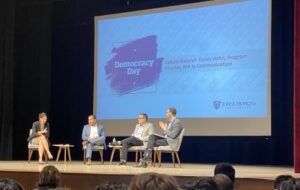SNF Agora Institute’s Democracy Day event featured a debate on AI risk mitigation vs. benefits
Can we harness AI’s extraordinary promise without falling victim to its dangers? That question sparked a lively debate between two Johns Hopkins experts during Democracy Day, held on August 21 as part of Johns Hopkins University’s Class of 2029 orientation program for new students.
Hosted by the SNF Agora Institute, the debate, “Artificial Intelligence: Risk Mitigation or Benefits Realization?” pitted Anton Dahbura, the executive director of the Johns Hopkins Information Security Institute and co-director of the Johns Hopkins Institute for Assured Autonomy, against Peter Najjar, the vice president of clinical innovation at the Johns Hopkins Health System and a practicing surgeon.
The debate allowed students to experience a healthy, productive debate, and gave Dahbura and Najjar an opportunity to discuss and share their perspectives on whether institutions and groups should be more or less cautious about embracing and implementing AI technology. Glory Liu, former assistant director of the SNF Agora Institute’s Center for Economy and Society and assistant research professor at the institute, moderated the debate, and Taylor Hahn, program director and senior lecturer for the Advanced Academic Programs’ Master of Arts in Communication, led a post-debate discussion.
Artificial intelligence is one of the most pressing and multifaceted topics facing society and impacts nearly every part of the world. There are varying opinions from experts and users on the use of AI, and all students will encounter and engage with AI technology during their studies at JHU, explains Dahbura. The topic is both timely and critical to discuss, and it is important to engage with people who do not share the same perspectives as these conversations lead to important breakthroughs and expand understanding of how AI is evolving.
Drawing on his cybersecurity expertise, Dahbura urged institutions to exercise caution in embracing AI and stressed the need to understand and prevent potential harms. While AI holds extraordinary promise, “this promise can morph into peril,” he said.

The post-debate debrief.
Najjar was less cautious, urging institutions to move forward rapidly with implementing technological advances in AI, conceding that in the name of progress, we have to accept the possible risks involved. He warned that slowing the development and deployment of AI could mean losing our opportunity to shape its future. “Missed opportunities are the biggest threats to AI and can have the biggest impacts,” he said.
Dahbura and Najjar also discussed instances of AI slowing, and adding guardrails to AI’s implementation, citing examples of legislation enacted in other countries that has shaped the advancement of AI and legislation that has limited its use, such as restricting law enforcement’s use of AI for facial recognition.
To regulate and establish guardrails for AI technology, it’s important for legislators to consult experts who have both the knowledge of AI broadly and the understanding of how AI works as well as its associated challenges and benefits before drafting legislation Dahbura said.
He explains that as AI has become more widely used, people are not questioning responses generated by chatbots as frequently, which he believes is critical for ensuring the technology is accurate, reliable, and safe. “When ChatGPT and its peers first emerged, we knew we had to fact-check them, but now that the technology is getting better, we tend to let our guard down, which can in fact allow more AI hallucinations to slip past our scrutiny” said Dahbura, adding, “The onus is on us as consumers to be cautious and understand AI’s limits. We’ve made big tradeoffs with AI, and one of the downsides is that it’s not always going to get things right.”
While experts are needed to address challenges related to AI, it’s important to recognize how these technologies are transforming the world. “AI-related technologies have opened up a whole new world of possibilities, and not all of the applications will be beneficial, unfortunately. Like many other things in society, we need to create new policies so that innovation can move forward responsibly, while safeguarding people against the risks of misuse and unintended consequences.”
